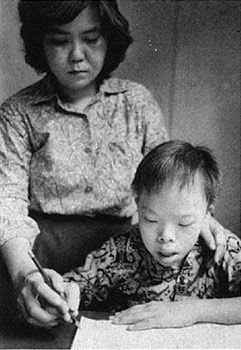Hesperian Health Guides
Chapter 32: Cognitive Delay
Cognitive delay ranges from mild to severe. The child with mild cognitive delay takes longer to learn certain skills. But with help he can grow up to care for himself and take an active, responsible part in the community. The child with severe cognitive delay, as he grows older, may stay at the mental age of a baby or young child. He will always need to be cared for in some ways.
Cognitive delay cannot be cured. However, all children with cognitive delay can be helped to progress more quickly. The earlier this begins, the more ability the child is likely to gain.
 |
| With help, some mentally slow children can learn to read and write, and do many of the things that normal children do. (Photo of a child with Down syndrome in Indonesia, by Carolyn Watson, Christian Children’s Fund.) |
Information on helping a child with cognitive or developmental delay is in Chapters 34 to 40. Chapters 34 and 35 discuss early child development and ways to help or stimulate a child to learn early skills (use of the senses, movement, and communication). Chapters 36 to 39 discuss learning for self-care (feeding, dressing, toileting, and bathing). Chapter 40 child behavior, and ways to encourage behavior that helps learning.
Other ideas for helping children with cognitive delay are in the CHILD-to-child activity, "Children Who Have Difficulty Understanding". Consider the needs and challenges of children with cognitive delay as they become sexually grown up.One important need that we do not include in detail in this book is education for children with cognitive delay. Some possibilities are discussed in Chapter 53, on education. But often specific teaching methods and materials are needed. An excellent book is Special Education for Mentally Handicapped Pupils. For toys that help a child learn, see Chapter 49.


